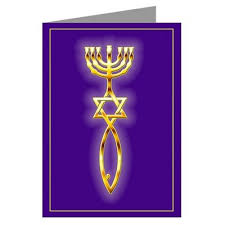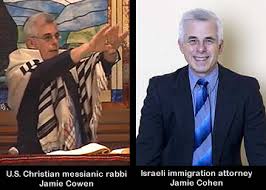| Jesus Christ My Lord and Messiah |
Since last
November, news reports about Israel persecuting Christians have escalated. This
generalized statement warrants a closer look at the details.
On November 24th of 2013, an Israeli immigration judge ordered the deportation of a Messianic Jewish man, Barry Barnett, from England, who had been arrested a week earlier while volunteering in an evangelism event hosted by Jews for Jesus in the city of Be’er Shiva, in southern Israel. He had been detained because the judge ruled that Barnett was not permitted to engage in missionary activity while in Israel.

This was the first arrest, imprisonment and deportation of any of the group’s members in Israel, and the decision raised concerns within the organization that immigration officials were cooperating with ultra-Orthodox Jews to interfere with foreign missionary work and evangelism, according to Barnett’s wife. In response, Dan Sered, Israel’s director for Jews for Jesus—an organization whose platform for evangelism is based on the Biblical New Covenant doctrine of Jesus Christ as Messiah—stated in a press release for Morning Star News,

“The global ethics code for tourism, which the state of Israel signed and even advertises on its own Ministry of Tourism Web page, states that tourism for the purpose of exchanging religious beliefs is not only valid but also should be encouraged”.
Sered’s valid concern is that this decision will serve as legal precedent for expelling others who are involved in any religious activities that are considered unacceptable to the Israeli government.

In its 2012 report on International Religious Freedom, the U.S. Department of State describes the attitude among Jews in Israel and the Occupied Territories toward missionary activities and conversations as negative, despite laws and policies in place that provide for religious freedom, as well as the Israeli government’s general respect of religious freedom in practice.
Supporting this view with numerous actual accounts of negative experiences is The Voice of the Martyrs (VOM), the Oklahoma-based nonprofit founded in 1967 that draws attention to worldwide persecution of Christians. Its focus this month is on Israel, which has been listed by the VOM as a “hostile nation” on its “restricted nations” map, a move which some may find extreme since those generally responsible for inflicting harm upon Christians—radical Muslims and anti-missionary Jewish activists—make up less than one percent of the population.
Nonetheless, kidnappings, bombings, anti-Christian graffiti and murders have all been cited by the watchdog organization as examples of hostilities directed toward Christians evangelizing in Israel. VOM breaks down the Christian demographic in Israel as follows:

"More than 120,000 Christians live in Israel, including about 17,000 Messianic Jewish believers. There are an estimated 8,000 Palestinian Arab evangelical believers, with 1,400 of those in the West Bank and 300 in Gaza.”
Interestingly, another related battle that has been waging in the judicial branch of Israeli government since 2010, has been won, and more accurately reflects the government’s views on religious freedom, rather than the views and actions of a small group of radicals and activists.
Legislation that offers municipal tax-exempt status to Jewish synagogues in Jerusalem was expanded by a special judicial tribunal to include a Messianic congregation in the capital city, after lawyers from the Jerusalem Institute of Justice (JIJ) petitioned the Court for equal status and won.

The ruling is important because all space used by the Messianic Congregation (an organization of Jews who believe that Jesus Christ is their Messiah) is subject to full tax relief, including pastor’s offices, meeting halls, a drug rehab center, children’s and youth facilities, and secondhand clothing distribution space.
Additionally, a retroactive discount will be applied to the last three years, for any Messianic congregations applying now for the tax-exempt status, which will add tens of thousands of shekels to the budgets of these groups throughout Israel. And according to the JIJ, it is highly unlikely that anti-Missionary groups determined to prevent court recognition of Messianic congregations, will try to overrule the new law, because they too benefit from the same tax exemptions.

We can only hope that this significant victory in government support of Messianic Jews will actually help curb the harassment of Christians in the Holy Land. Sadly, whether laws that defend religious freedom are in place or not, many cultures today are becoming more antagonistic toward Christians, as humanity approaches the glorious return of Jesus Christ, just as Matthew Chapter 24 declares, in verses 9 and 10: Then they will deliver you up to tribulation and kill you, and you will be hated by all nations for My name’s sake. And then many will be offended, will betray one another, and will hate one another.
On November 24th of 2013, an Israeli immigration judge ordered the deportation of a Messianic Jewish man, Barry Barnett, from England, who had been arrested a week earlier while volunteering in an evangelism event hosted by Jews for Jesus in the city of Be’er Shiva, in southern Israel. He had been detained because the judge ruled that Barnett was not permitted to engage in missionary activity while in Israel.
This was the first arrest, imprisonment and deportation of any of the group’s members in Israel, and the decision raised concerns within the organization that immigration officials were cooperating with ultra-Orthodox Jews to interfere with foreign missionary work and evangelism, according to Barnett’s wife. In response, Dan Sered, Israel’s director for Jews for Jesus—an organization whose platform for evangelism is based on the Biblical New Covenant doctrine of Jesus Christ as Messiah—stated in a press release for Morning Star News,
“The global ethics code for tourism, which the state of Israel signed and even advertises on its own Ministry of Tourism Web page, states that tourism for the purpose of exchanging religious beliefs is not only valid but also should be encouraged”.
Sered’s valid concern is that this decision will serve as legal precedent for expelling others who are involved in any religious activities that are considered unacceptable to the Israeli government.
In its 2012 report on International Religious Freedom, the U.S. Department of State describes the attitude among Jews in Israel and the Occupied Territories toward missionary activities and conversations as negative, despite laws and policies in place that provide for religious freedom, as well as the Israeli government’s general respect of religious freedom in practice.
Supporting this view with numerous actual accounts of negative experiences is The Voice of the Martyrs (VOM), the Oklahoma-based nonprofit founded in 1967 that draws attention to worldwide persecution of Christians. Its focus this month is on Israel, which has been listed by the VOM as a “hostile nation” on its “restricted nations” map, a move which some may find extreme since those generally responsible for inflicting harm upon Christians—radical Muslims and anti-missionary Jewish activists—make up less than one percent of the population.
Nonetheless, kidnappings, bombings, anti-Christian graffiti and murders have all been cited by the watchdog organization as examples of hostilities directed toward Christians evangelizing in Israel. VOM breaks down the Christian demographic in Israel as follows:
"More than 120,000 Christians live in Israel, including about 17,000 Messianic Jewish believers. There are an estimated 8,000 Palestinian Arab evangelical believers, with 1,400 of those in the West Bank and 300 in Gaza.”
Interestingly, another related battle that has been waging in the judicial branch of Israeli government since 2010, has been won, and more accurately reflects the government’s views on religious freedom, rather than the views and actions of a small group of radicals and activists.
Legislation that offers municipal tax-exempt status to Jewish synagogues in Jerusalem was expanded by a special judicial tribunal to include a Messianic congregation in the capital city, after lawyers from the Jerusalem Institute of Justice (JIJ) petitioned the Court for equal status and won.
The ruling is important because all space used by the Messianic Congregation (an organization of Jews who believe that Jesus Christ is their Messiah) is subject to full tax relief, including pastor’s offices, meeting halls, a drug rehab center, children’s and youth facilities, and secondhand clothing distribution space.
Additionally, a retroactive discount will be applied to the last three years, for any Messianic congregations applying now for the tax-exempt status, which will add tens of thousands of shekels to the budgets of these groups throughout Israel. And according to the JIJ, it is highly unlikely that anti-Missionary groups determined to prevent court recognition of Messianic congregations, will try to overrule the new law, because they too benefit from the same tax exemptions.
We can only hope that this significant victory in government support of Messianic Jews will actually help curb the harassment of Christians in the Holy Land. Sadly, whether laws that defend religious freedom are in place or not, many cultures today are becoming more antagonistic toward Christians, as humanity approaches the glorious return of Jesus Christ, just as Matthew Chapter 24 declares, in verses 9 and 10: Then they will deliver you up to tribulation and kill you, and you will be hated by all nations for My name’s sake. And then many will be offended, will betray one another, and will hate one another.


No comments:
Post a Comment